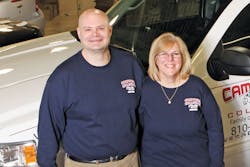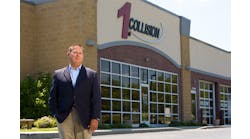For Campbell Collision, 40 is fabulous. The Brighton, Mich.-based independent shop, owned by Bob and Donna Campbell, celebrated the big four-oh in 2009 by investing in a marketing campaign that thanked its community and customers, highlighted its strengths and emphasized its staying power. Customers got the presents—literally, in the form of birthday-related raffles and giveaways—but Campbell Collision got the ultimate gift: a nearly 7 percent increase in revenues from 2008 to 2009.
“We’d been doing some advertising the last couple of years, but we decided to kick it up a notch,” says Donna, who also serves as Campbell Collision’s office manager and heads up the shop’s marketing efforts. As a result, the Campbells doubled their advertising budget in 2009, spending in the low five-figures on marketing.
Beginning in the 6,750-square-foot shop’s typically slower spring months, the Campbells got busy marketing their business, which had 12 employees and revenues of $1.45 million in 2009. They sat down with Mary Wheeler, automotive account executive for the Livingston County Daily Press & Argus, and planned a print and online advertising strategy that would take them from April through the end of the year. “In promoting the Campbell’s 40th anniversary, we discussed what their expectations were and set a monthly advertising budget,” Wheeler says. “The campaign combined several of our products to give them maximum exposure in the community.”
An online banner ad was created for the newspaper’s website, which attracts more than 100,000 unique Internet visitors per month. A series of print ads ran throughout the paper, including the weekly NASCAR page, the monthly On the Road auto section, and in a new supplement called Livingston Life. In addition, several coupon-type ads were created to help track the response. Radio ads were also part of the shop’s anniversary ad campaign mix.
Saying Thanks, Spreading a Message
The initial goal was to say “thank you for 40 great years” to the Livingston County community and the shop’s customers, Donna says. So the Campbells drafted a press release_notes that highlighted the anniversary and invited people to enter a raffle during the month of May. The first 40 entrants won a flash drive; the raffle prizes included an Xbox 360, an iPod Shuffle and a gift certificate to a local restaurant. No purchase—or previous history with Campbell Collision—was necessary to enter. “This was done purely for branding and as a thank you to the community,” Donna says. “We thought if they got in the door and saw how professional our building and staff is, that might stick with them [when they needed a repair].” Additional flash drives were given to local insurance agents as a thank you for working with the Campbells through the years.
Beyond expressing gratitude, Campbell Collision had an important message to communicate: At a time when numerous dealer shops in the area had closed, the Campbells wanted people to know that their shop was in solid financial shape and planned to be in business for years to come. For a shop that touts lifetime warranties on its work, that was a key point to make.
The shop also had specific services, like detailing and its new mobile estimating service, to promote. In an effort to drive business for Campbell Collision’s detailing services, for example, in December the Campbells had Wheeler place ads in newspaper sections that were geared toward female readers and promoted gift certificates.
A Value Proposition
Doubling your marketing budget during a recession may seem counterintuitive. After all, when business is scarce and every dollar counts, cutting back can seem like a no-brainer. But that’s not how the Campbells see it.
“That’s the worst place to cut — especially right now, when competition is so fierce,” Bob says. Donna agrees: “You have to look at your overall cash flow before you decide to [spend that money], but if nobody knows you’re out there because you stop your marketing, who are they going to go to when they have an accident?”
That’s the right attitude, says Anita Price, vice president of McCullough Communications & Marketing, a Newport Beach, Calif.-based strategic marketing, advertising and PR firm that has worked with collision repair clients. “Collision repairers should view marketing in an economic downturn as an investment, rather than an expense,” she says. “As a result of lower sales, many collision repairers ask themselves, ‘Where can I cut marketing dollars to decrease my monthly expenses?’ The question they should be asking themselves is, ‘How can I best utilize my marketing dollars to ensure a greater return on investment and grab a greater share of the collision repair dollars being spent in my geographic market?’”
“While overall collision repair volume is down, smart shop owners who continue marketing during the recession with a focus on ROI can take advantage of lower media prices and fewer of their competitors advertising to stand out from the crowd and maintain their previous volumes or even grow their businesses during these tough economic times,” Price says.
Maintaining a strong marketing presence during a recession will pay long-term dividends, too, Price adds, because it costs less to maintain mindshare than to rebuild it when the economy rebounds.
Bob and Donna carefully analyzed their ad spending and the value it brought to their business, and made tweaks as needed. The reasonable rates of the local paper’s online banner ad, for example, make it worthwhile—and the Campbells have noticed a steady increase in click-throughs, which now average about 200 to 300 per week. While Donna can’t prove that that translates into actual customers or sales for Campbell Collision, it offers a comfort factor because she knows potential customers are viewing her website.
Radio ads, on the other hand, were done for just three months—in part because of the greater expense, and because Donna found the medium harder to track. “To me you have to constantly review what works and what doesn’t and spend your money wisely,” Donna says, noting that she’d consider adding radio back into Campbell Collision’s ad mix in the future.
Indeed, for the Campbells, the overall ad strategy proved a wise investment: In the second half of the year, month-over-month sales growth was in the double digits, and overall sales growth from 2008 to 2009 was 6.9 percent.
Online Efforts
The Campbells also revamped their shop’s website (campbellcollision.net) in January 2009 by hiring Impact Media Professionals to enhance and update Campbell Collision’s Web presence.
Campbell Collision boosted its marketing budget during its birthday year, but collision repair shops can take advantage of the inexpensive marketing benefits of social media anytime. Anita Price, vice president of McCullough Communications & Marketing, a Newport Beach, Calif.–based strategic marketing, advertising and PR firm, offers these tips for creating an effective social media presence:
• Develop a social media messaging strategy to ensure that you’re reinforcing your brand with consistent messages across all marketing channels.
• Create a page on Facebook and link it to Twitter.
• If your customer database includes email addresses, use them to invite “friends” on your Facebook page.
• Use social media to create two-way dialogue with your customers and potential customers, as well as to promote your business with specials, links to coupons on your website, etc.
• If you sponsor a local team or charity, promote it on your social networking pages. Upload pictures of the team or a charity event on your social networking pages to give your shop a human touch.
• Provide links to your social networking pages on your website’s home page.
Four years ago, the Campbells launched what Donna calls a “canned” site, using available templates. “It was a start,” she says—but not much more.
The redesign, including an updating of the Campbell Collision logo, cost $600; today, the Campbells invest about $100 a month in their web presence.
“So many people out there are technologically inclined, and they’re busy,” Donna says. “They get in an accident and quickly go online. If you have a website, you get the first opportunity to show yourself off to that person.”
Next up for the shop is creating a social media presence—something the Campbells admit to being behind on. Doing so would be a boon to their marketing efforts, Price says. “Your customers and potential customers are using Twitter, Facebook and other social media platforms. If your shop does not have a social media presence, you’re missing out on a huge opportunity to promote your business at a very minimal cost.”
Building Relationships
Of course, when it comes to business building efforts, the Campbells go beyond advertising. Strengthening relationships with both insurance companies and customers is a priority. Campbell Collision has seven DRPs, but Donna sees the shop as a voice for the customer when it comes to dealing with any insurance company. Recently, some customers have indicated that they can’t afford to have their vehicle considered a total loss. “We share that information with the adjuster,” Donna says. “We say, ‘Here’s what we’re hearing from the customer.’”
The shop has worked hard to stay relevant by finding new ways to meet customers’ needs—most recently by starting a free loaner car program and adding a mobile estimating service. As a single shop with a small staff, the Campbells knew they could lose customers because of their limited hours. “People are looking for convenience,” Donna says. The mobile estimating service offers that convenience: A shop employee comes to the customer’s home or office, writes an estimate, and immediately schedules them for the job.
The Campbells get business the old fashioned way, too: They ask for it. Donna has personally built up the shop’s fleet repair business, which typically comprises one-third of its sales, by persistently cold-calling appropriate companies.
“It really [isn’t] any different from working with an insurance company,” she says of the fleet business. “They have territories, so if they already have a shop in that territory then they won’t add you to their network. But unless you ask, you won’t know, and I’m very comfortable [asking].”
Strengthening Community Roots
The Campbells are also active members of the Livingston County community. Bob and Donna are on the board of directors of the Brighton Optimist Club, and sponsor a local fishing derby for kids.
It’s all part of the strategy for a shop with deep roots in a fast-growing community. “Years ago, my dad was active in the community and knew the local people,” Bob says. “Now you have people who don’t know that we’ve been here a long time.” Established companies like his, he continues, can’t simply sit back and assume that because they’ve been around a long time, that’s good enough. “You have to keep reminding people that you’re there, and ready to take care of them.” That approach, after all, has worked for 40 years, and the Campbells are banking on it working for 40 more.



